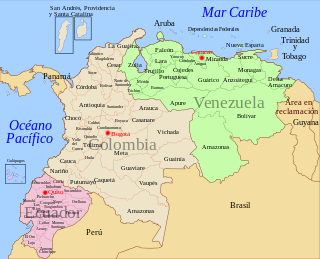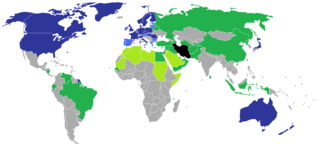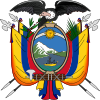Colombia seeks diplomatic and commercial relations with all countries, regardless of their ideologies or political or economic systems. For this reason, the Colombian economy is quite open, relying on international trade and following guidelines given by international law.

This article describes the diplomatic affairs, foreign policy and international relations of Ecuador

Ecuador and the United States maintained close ties based on mutual interests in maintaining democratic institutions; combating cannabis and cocaine; building trade, investment, and financial ties; cooperating in fostering Ecuador's economic development; and participating in inter-American organizations. Ties are further strengthened by the presence of an estimated 150,000-200,000 Ecuadorians living in the United States and by 24,000 U.S. citizens visiting Ecuador annually, and by approximately 15,000 U.S. citizens living in Ecuador.

The Central Bank of Iran (CBI), also known as Bank Markazi, officially the Central Bank of the Islamic Republic of Iran is the central bank of Iran.

The Islamic Republic of Iran officially recognises Palestine as a state. Ali Khamenei, the Supreme Leader of Iran, rejects a two-state solution and implies that Palestine is inseparable, while Iran's former President Mahmoud Ahmadinejad called for a free referendum for the entire Palestinian population, including Arab citizens of Israel, to determine the type of government in the future Palestinian State, while reiterating that establishment of a Palestinian State alongside Israel would "never mean an endorsement of the Israeli occupation".

Iran–Venezuela relations have strengthened substantially in recent years. "Iran and Venezuela are two friendly and united states which pave their ways to further progress and welfare for their nations", according to President Rouhani. The two countries are contemporary strategic allies of the Russian Federation and the People's Republic of China while opposing U.S. hegemony in their respective regions.

Iran–Tajikistan relations refer to the bilateral relations between Iran and Tajikistan. Since the collapse of the Soviet Union, the two countries have naturally enjoyed a close and strong relationship with the two often being described as "one spirit in two bodies" by the ex-president of Iran Mahmoud Ahmadinejad due to both being Persian-speaking and Iranic countries.

Colombia–Ecuador relations refers to the bilateral relations between the neighbouring Colombia and Ecuador. The present territory of both countries was part of the Spanish Empire from the sixteenth to nineteenth centuries. After the wars for independence against Spain led by Simón Bolívar, Ecuador, Colombia, and Venezuela became part of the Republic of Gran Colombia in 1819. Both nations are members of the Community of Latin American and Caribbean States, Organization of Ibero-American States, and Organization of American States.

The 2008 Andean diplomatic crisis was a diplomatic stand-off between the South American countries of Ecuador, Colombia and Venezuela. It began with an incursion into Ecuadorian territory across the Putumayo River by the Colombian military on March 1, 2008, leading to the deaths of over twenty militants, including Raúl Reyes and sixteen other members of the Revolutionary Armed Forces of Colombia (FARC). This incursion led to increased tension between Colombia and Ecuador and the movement of Venezuelan and Ecuadorian troops to their borders with Colombia.

Cuba-Iran relations, which are characterized by economic and diplomatic cooperation, are quite friendly. Iran has a productive trade balance with Cuba. The two governments signed a document to bolster cooperation in Havana in January 2006. President Mahmoud Ahmadinejad called relations "firm and progressive" over the past three decades.

Reactions to the 2009 Iranian presidential election varied across the world. Most Western countries expressed concern, while most countries in Latin America, Asia, and Africa that expressed any opinion congratulated Mahmoud Ahmadinejad for his victory. The UN and EU also expressed concern about the aftermath.

The foreign policy of the Rafael Correa administration (2007-2017) was the policy initiatives towards other states by the former President of Ecuador, as differed to past, or future, Ecuadorian foreign policy. Correa's foreign policy was somewhat similar to that of the other leaders of the Bolivarian Alternative for the Americas (ALBA) such as Hugo Chavez and Evo Morales. This entailed a rough division between relations with other states of the Americas and the rest of the world.

Brazil–Iran relations are the bilateral relations between the Federative Republic of Brazil and the Islamic Republic of Iran. Relations are characterized by economic and diplomatic cooperation and are quite friendly. Iran has a productive trade balance with Brazil. The two governments signed a document to bolster cooperation during the G-15 Summit in Tehran in 2010. However, since the election of former Brazilian president, Dilma Rousseff, relations between the two countries recently have deteriorated greatly, following Rousseff shifting Brazil away from Iran due to Iran's violation of human and civil rights. Mahmoud Ahmadinejad's media adviser, Ali Akbar Javanfekr, was quoted as stating that Rousseff had "destroyed years of good relations" between them. He denied making such a statement.

Iran and Sri Lanka have had official diplomatic relations since 1961.

Iran and Lebanon have diplomatic relations, with embassies in each other countries. Since the Iranian Revolution in 1979, the two countries have deepened relations amidst controversy in Lebanon and abroad.

Gambia–Iran relations are the bilateral relations between The Gambia and Iran. Neither country has a resident ambassador.
Content from the United States diplomatic cables leak has depicted Iran and related subjects extensively. The leak, which began on 28 November 2010, occurred when the website of WikiLeaks—an international new media non-profit organisation that publishes submissions of otherwise unavailable documents from anonymous news sources and news leaks—started to publish classified documents of detailed correspondence—diplomatic cables—between the United States Department of State and its diplomatic missions around the world.
Events in the year 2011 in the Islamic Republic of Iran.

Iran–Sudan relations refers to diplomatic, economic and military relations between Sudan and Iran. For nearly three decades, Iran and Sudan enjoyed a close relationship.

Ghana–Iran relations refers to the current and historical relationship between Ghana and Iran. Ghana has an embassy in Tehran, and Iran has an embassy in Accra.


















